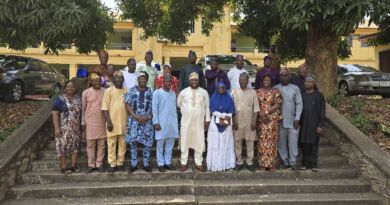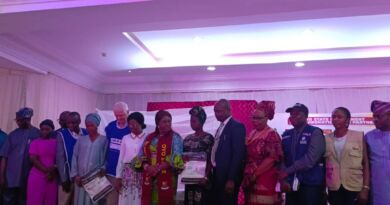UNICEF urges Oyo residents to dismiss myths, misconception about COVID-19 vaccine
By Ogundele Olanrewaju
The United Nations Children’s Fund (UNICEF) has urged residents of Oyo State and the country in general to dismiss myths and misconceptions been spread about COVID-19 vaccine.
Mrs Aderonke Akinola- Akinwole, the UNICEF Communication for Development Specialist for Akure Field Office, stated this on Thursday, at the end of the three- day stakeholders’ advocacy meeting held in Oyo town.
The advocacy meeting was organised by UNICEF in conjunction with the National Orientation Agency (NOA).
Akinola- Akinwole explained that the meeting was to educate the populace and clear all doubts about the efficacy and safety of receiving the COVID-19 vaccine by residents of the state especially those living at the grassroots.
She noted that different myths, misconceptions and rumours were been peddle around to discourage Nigerians from taking COVID-19 vaccine.
She dismissed rumour that the vaccine causes early death, sterility or aiming to wipe out generations and enjoined the people to shun all unfounded assumptions about the vaccine.
According to her, taking the first and second doses of the vaccine will help reduce the effects of COVID-19 disease if contracted at all.
She assured the people that the vaccine was safe, effective and free of charge.
She charged the media practitioners, traditional leaders, youth and market leaders who were the participants of the advocacy meeting to play their respective roles by sensitising the residents on the need to take COVID-19 vaccine.
She said media practitioners have vital role to play in demystifying misconception and rumors about COVID-19 vaccine.
Akinola- Akinwole said the traditional rulers who are the gate keepers of every community were the right channel through which various community members would know the important of COVID-19 vaccination “and go out to get vaccinated.
“We believe there are so many rumours and misconceptions that gone out there, the traditional rulers can help us channel the right messages to the communities and encourage the people to stop spreading rumour.”
She further charged the leaders of youth associations and market associations to step up in sensitising traders in their respective markets to visit nearby vaccination centres to get the COVID-19 jab.
In her opening remarks at the meeting, the NOA State Director, Mrs Folake Ayoola, said the collaboration between her agency and UNICEF was to create more awareness on the need for the people to get vaccinated.
Ayoola urged all the participants to use knowledge gained during the meeting to sensitise people in their respective communities, their association members to abide with COVID-19 protocols and guidelines as a way of curtailing its spread.
She also implored them to encourage residents in the state to take COVID-19 vaccine.
Also the Oyo State Immunisation Officer, Mrs Oloruntosin Bolarinwa, said the state did not record any serious adverse effect on those that took the jab and implored the traditional rulers to use their respective positions as the fathers of all to prevail on their subjects to get vaccinated against COVID-19.
She urged the people to go out and take the vaccine, “get your first, second shot, get yourself protected thereby protect your community, not only protecting your community but be an encouragement to others so that everyone of us will be vaccinated”
Among the participants at the meeting were traditional rulers – Oba Lekan Balogun, the Otun Olubadan of Ibadan; Oba Adeyeye Oyetunji, Alajaawa of Ajaawa and Oba Johnson Olatunde, the Alamodu of Ago-Amodu
The Iyaloja of Ibadan land, Chief Iswiat Aneringun; some youth leaders, Ilori Olusegun (Oluyole LGA) and Salman Adam (Saki East) also attended the advocacy meeting.
In their submissions, the participants urged government and its relevant agencies to do more in creating awareness on the pandemic, noting that some people especially rural dwellers were yet to be adequately informed.
They implored those in charge of the COVID-19 vaccination to bring vaccination and testing centres nearer to the people, especially rural communities.
They pledged their support in the fight against the pandemic and promised to encourage their subjects to take the vaccine.




